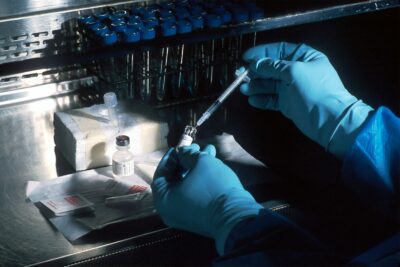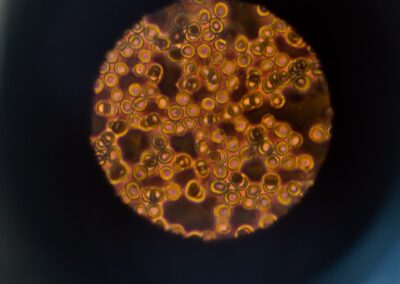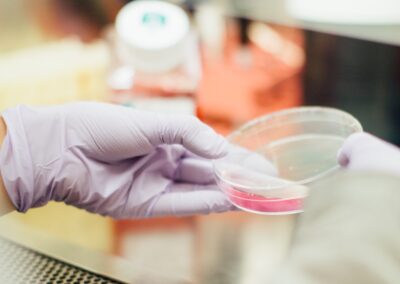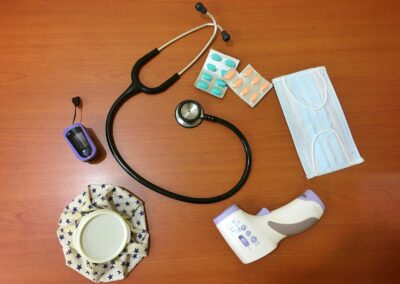Advancements in Biotechnology for Cancer and Genetic Disorders
Transforming Cancer Treatment with Precision Medicine
Biotechnology in targeted therapies has revolutionized the approach to cancer treatment, offering new hope through precision medicine. Traditional cancer treatments, such as chemotherapy and radiation, often affect healthy cells along with cancerous ones, leading to significant side effects. However, advancements in biotechnology have enabled the development of targeted therapies that specifically attack cancer cells while sparing healthy tissue. This precision reduces adverse effects and improves patient outcomes. In Saudi Arabia and the UAE, where healthcare innovation is a priority, investing in biotechnological research for cancer treatment aligns with the regional goals of advancing medical care and improving public health. Targeted therapies, such as monoclonal antibodies and small molecule inhibitors, exemplify how biotechnology can transform cancer treatment by offering more effective and personalized solutions.
Addressing Genetic Disorders with Advanced Biotechnologies
The application of biotechnology in targeted therapies extends beyond cancer to include the treatment of genetic disorders. Gene therapy, a groundbreaking biotechnological innovation, involves correcting defective genes responsible for disease development. Techniques such as CRISPR-Cas9 gene editing allow scientists to precisely alter DNA sequences, offering potential cures for genetic disorders that were previously deemed untreatable. For regions like Saudi Arabia and the UAE, where genetic disorders can have a significant impact on the population, advancing gene therapy research is crucial. By supporting biotechnological advancements, these regions can enhance their healthcare systems and provide patients with access to cutting-edge treatments. The potential to correct genetic defects at the molecular level represents a monumental shift in how genetic disorders are managed and treated.
Developing Targeted Therapies for Complex Diseases
The role of biotechnology in targeted therapies also includes the development of treatments for complex diseases beyond cancer and genetic disorders. Conditions such as autoimmune diseases, neurological disorders, and infectious diseases can benefit from targeted therapeutic approaches. Biotechnology enables the identification of specific molecular targets involved in disease processes, allowing for the creation of therapies that intervene at precise points. In the context of Saudi Arabia and the UAE, where there is a strong focus on advancing medical research, investing in the development of targeted therapies for complex diseases aligns with regional healthcare objectives. By leveraging biotechnological innovations, these regions can address unmet medical needs and improve the quality of life for patients with complex conditions.
Opportunities for Business Success in Biotechnology
For business executives and entrepreneurs, the advancements in biotechnology in targeted therapies present significant opportunities for success and growth. The development of targeted therapies requires substantial investment in research and development, offering businesses the chance to lead in innovative medical solutions. In Saudi Arabia and the UAE, where there is a robust emphasis on fostering a knowledge-based economy, biotechnology represents a key area for investment. Companies that prioritize the development of targeted therapies can gain a competitive edge by addressing critical healthcare challenges and contributing to the advancement of personalized medicine. By aligning business strategies with biotechnological innovations, enterprises can drive growth, enhance their market position, and support regional healthcare goals.
Enhancing Healthcare Outcomes Through Biotechnology
The integration of biotechnology in targeted therapies into healthcare systems has profound implications for improving patient outcomes. Targeted therapies offer more precise and effective treatments, reducing the need for invasive procedures and minimizing side effects. For healthcare providers in Saudi Arabia and the UAE, incorporating these advanced therapies into clinical practice can lead to better management of diseases and improved patient satisfaction. Additionally, the focus on personalized medicine, supported by biotechnological advancements, aligns with the broader goals of providing high-quality, patient-centered care. By embracing targeted therapies, healthcare systems can enhance treatment efficacy, reduce healthcare costs, and achieve better long-term health outcomes for patients.
Future Trends and Developments in Targeted Therapies
Looking ahead, the field of biotechnology in targeted therapies is poised for continued growth and innovation. Emerging trends such as the use of artificial intelligence in drug discovery, the development of combination therapies, and the exploration of novel biological targets will further enhance the effectiveness of targeted treatments. In Saudi Arabia and the UAE, staying ahead of these trends will be crucial for maintaining a leadership position in the global healthcare landscape. Continued investment in biotechnological research, fostering public-private partnerships, and supporting regulatory frameworks that encourage innovation will be key strategies for advancing targeted therapies. By prioritizing these efforts, stakeholders can ensure that the benefits of biotechnology are fully realized, leading to improved healthcare outcomes and economic growth.
#Biotechnology #TargetedTherapies #CancerTreatment #GeneticDisorders #PrecisionMedicine #BiotechInnovations #PersonalizedMedicine #HealthcareAdvancements #MedicalResearch #AdvancedTreatments































